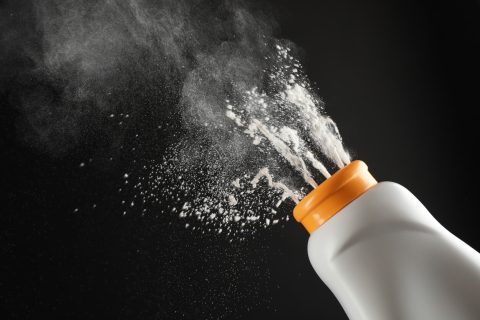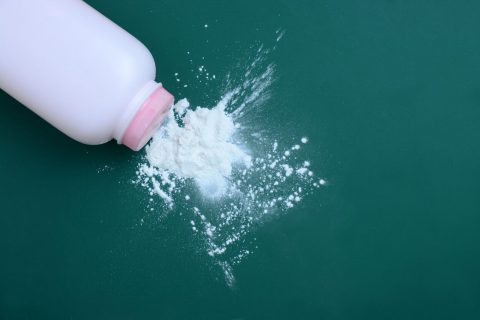
Talcum Powder Recall
Johnson & Johnson recalled 33,000 bottles of Johnson’s Baby Powder in October 2019 after the U.S. Food and Drug Administration found small amounts of asbestos in a tested sample. The company faced thousands of ovarian cancer lawsuits and stopped selling talc-based powder globally in 2023. Johnson & Johnson maintains its talc-based baby powder was safe despite discontinuing sales.
Why Was There a Talcum Powder Recall?
Johnson & Johnson voluntarily recalled all Johnson’s Baby Powder bottles from lot #22318RB on Oct.18, 2019, after the FDA found asbestos in the product. In response to the recall, major retailers, including Walmart, CVS and Rite Aid, pulled all 22-ounce bottles from their shelves.
The company announced it would replace talc with cornstarch in its products in 2023. Despite mounting lawsuits, Johnson & Johnson said its decision to stop selling its talc-based baby powder globally was based on low sales, not safety issues.
It is a product discontinuation, it said, not a recall or market withdrawal.
The FDA has tested samples of cosmetic products containing talc since 2018. In September 2024, a routine FDA test that found asbestos in Dynacare baby powder sparked a new recall for 14-ounce bottles of baby powder with batch/lot number B051.
-
1950s
A 2018 Reuters investigation revealed the earliest mentions of tainted Johnson & Johnson talc-containing tremolite, a mineral classified as asbestos, in the 1950s.
-
1971
A study published in BJOG: An International Journal of Obstetrics and Gynecology found talc particles “deeply embedded” in ovarian and cervical cancer tumors.
-
1975
Johnson & Johnson acknowledged the link between talc use on the genitals and ovarian cancer, referring to it as the “talc ovary problem” in an internal memo released during an ovarian cancer trial in 2017.
-
1976
Johnson & Johnson told the FDA there was no asbestos in its talc tested between December 1972 and October 1973. It was later revealed that at least three tests from 1972 to 1975 found asbestos in the talc.
-
1982
A case-control study found women who used talcum powder on their genitals or sanitary napkins had a higher risk of ovarian cancer than women who did not.
-
2006
The International Agency for Research on Cancer, an arm of the World Health Organization, listed genital talc use as “possibly carcinogenic to humans.” Johnson & Johnson’s talc supplier, Imerys, began adding warnings about genital talc use and ovarian cancer in its shipments to Johnson & Johnson.
-
2011
A study by Dr. Daniel W. Cramer and colleagues found long-term talcum powder use increased ovarian cancer risk by 30%. Women who used it the longest had the greatest risk.
-
2016 to 2017
Juries awarded verdicts of $72 million, $55 million, $70 million, $110 million and $417 million to women who claimed Johnson & Johnson’s talc-containing products caused their ovarian cancer. Some of these verdicts were overturned on appeal.
-
2018
FDA began testing cosmetic talc products for traces of asbestos, including talc-containing makeup.
-
April 2018
A jury awarded $117 million to a man who claimed asbestos-contaminated Johnson’s Baby Powder and Shower to Shower led him to develop mesothelioma.
-
July 2018
A jury awarded $4.17 billion to 22 women who claimed Johnson & Johnson’s asbestos-contaminated talc products caused them to develop ovarian cancer.
-
February 2019
Johnson & Johnson’s talc supplier, Imerys Talc America Inc., filed for bankruptcy after being hit with about 14,650 suits claiming its talc contained asbestos.
-
July 2019
The U.S. Justice Department began a criminal investigation into whether Johnson & Johnson lied about the cancer risk linked to its talc-based products.
-
August 2019
Johnson & Johnson questioned the reliability of the plaintiffs’ experts and the science linking talcum powder to cancer. The company previously called studies linking cancer to talc “junk science.”
-
October 2019
After the FDA found asbestos in a Johnson’s Baby Powder sample, Johnson & Johnson recalled thousands of bottles of baby powder from lot #22318RB.
-
April 2020
In a Daubert ruling, U.S. District Judge Freda Wolfson found that plaintiffs’ experts’ opinions on talcum powder and cancer were “substantially supported by the science” and allowed them to present their opinions to a jury.
-
May 2020
Johnson & Johnson stopped selling talc-based baby powder in the U.S. and Canada, replacing talc with cornstarch.
-
2023
Johnson & Johnson discontinued sales of talc-based powder worldwide.
How Discontinuation Affects Talc Litigation
As of April 2025, Johnson & Johnson faced more than 58,208 federal lawsuits and thousands more in state courts. These suits allege that Johnson’s Baby Powder and Shower to Shower talc-based products caused ovarian cancer and mesothelioma and that the company failed to warn the public about the risk.
Trent Miracle, a mass torts and product liability attorney, told Drugwatch the company’s decision to stop selling its talc-based baby powder could lead to more talcum powder lawsuits.
“Many people may [still] have been unaware of the link between talcum powder usage and cervical cancer but the discontinuation was fairly big news and put a new highlight on that link,” said Miracle, who has been at the forefront of talcum powder litigation. “This could result in many more people with a cervical cancer diagnosis contacting attorneys, resulting in a larger amount of litigants.”
Miracle said the discontinuation could prompt more law firms to “feel more confident about the litigation” and become involved.
“Since the product is no longer on the market, Johnson & Johnson has somewhat less incentive to ‘go to the mat’ defending the product since it is no longer a revenue stream for the company,” he said.
The company’s decision to stop selling talc products could also be used against Johnson & Johnson “frequently and effectively” at trial. Miracle added that the recall, discontinuation, and 2020 ruling greatly improved the chances of settlement talks.
Johnson & Johnson reached a $700 million settlement with 42 states over the marketing of its talc-based baby powder and other products in January 2024. The settlement was part of a larger deal to address claims about the product’s safety.
Then, in May 2024, Johnson & Johnson offered to settle all remaining ovarian cancer claims in multidistrict litigation for $6.48 billion. Until plaintiffs approve a settlement, litigation remains open and attorneys are still actively taking cases.
Can You Still Buy Talc-Based Baby Powder?
Talc remains legal in the U.S. Many baby powder brands now use cornstarch instead, which is less controversial but still poses health risks. Johnson & Johnson’s decision to stop selling its talc-based baby powder only affects its own products. Other talc-based baby powder brands are still available.
Some of these powders, such as Angel of Mine Baby Powder and Spring Fresh Dusting Powder, include warning labels that applying talcum powder to the female genital area may increase ovarian cancer risk.
Consumers looking for an alternative to talcum powder can use Johnson & Johnson’s cornstarch-based baby powder, which remains on shelves.
Other alternatives to talcum powder include arrowroot starch-based powders and tapioca starch-based powders.
Calling this number connects you with a Drugwatch.com representative. We will direct you to one of our trusted legal partners for a free case review.
Drugwatch.com's trusted legal partners support the organization's mission to keep people safe from dangerous drugs and medical devices. For more information, visit our partners page.





